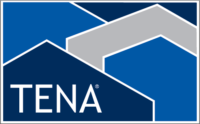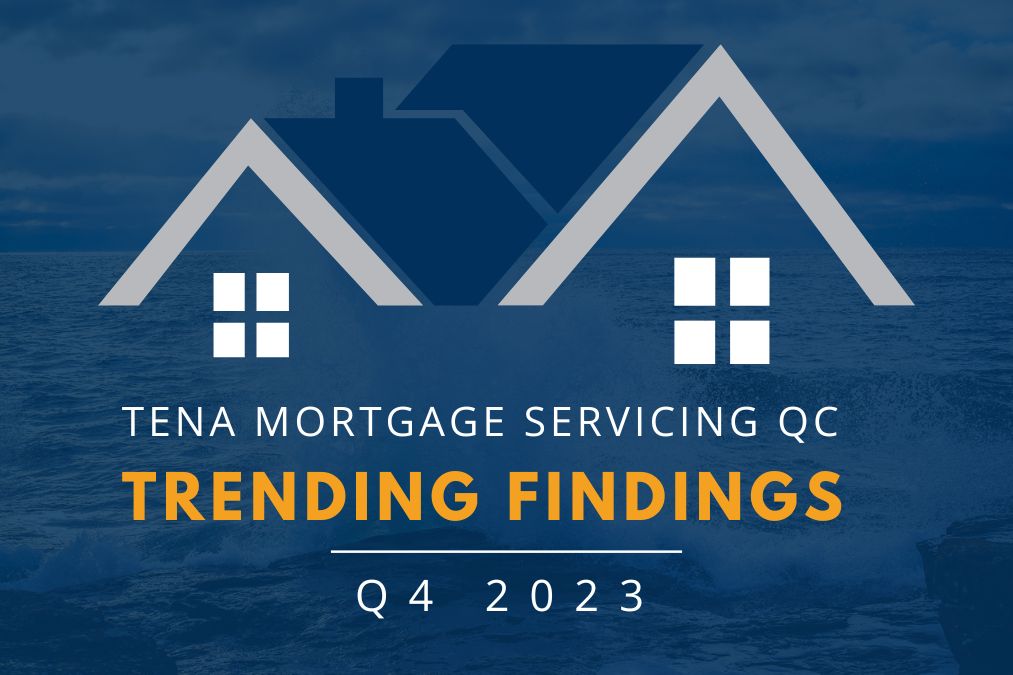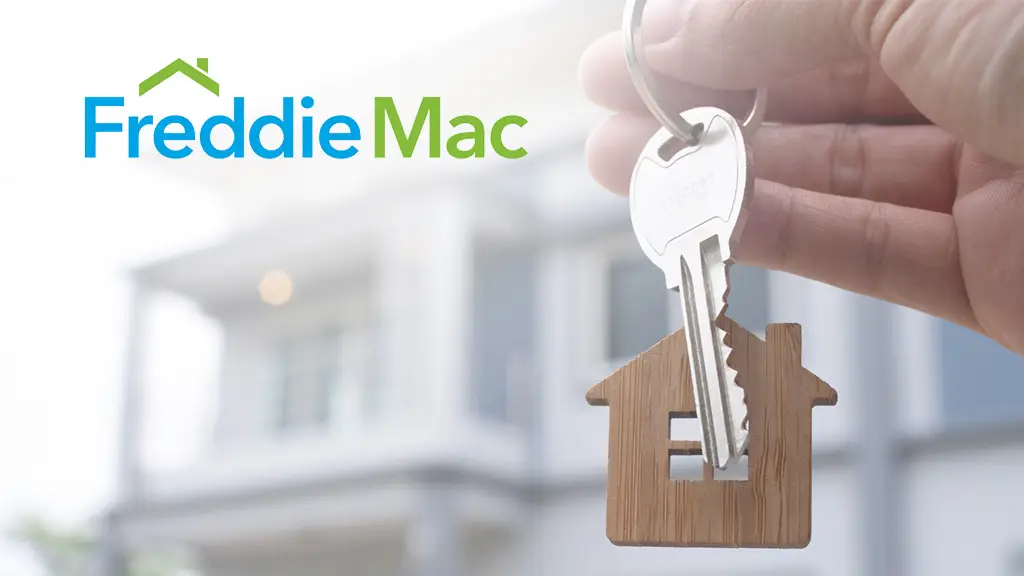Q4 2023 | TENA Mortgage Servicing QC Notable Audit Findings
This summary represents an analysis of Servicing Quality Control data from servicing life events analyzed by TENA’s Servicing Quality Control Department during the fourth quarter of 2023. During that timeframe, thousands of Mortgage Servicing Quality Control reviews were conducted with over 1,500 unique audit exceptions cited by TENA auditors. Those audit results were analyzed to identify emerging trends and common findings. The following audit findings were identified as being notable.
- Audit Finding: (S999-99-058) Evidence in the file suggested the account status reported to the credit repositories was inaccurate.
A number of investors and agencies require servicers to provide to all four major credit repositories, on a monthly basis, accurate status reports for all mortgage loans being serviced. These reports utilize specific status codes to designate the status of every mortgage as it exists on the last calendar day of each month. Milestones for these status reports include:
- all new originations;
- all non-delinquent (current) mortgage loans;
- all delinquent mortgage loans – including whether they are 30, 60, or 90+ days delinquent; and
- all liquidated mortgage loans (i.e. short sales, deed-in-lieu, foreclosure, etc.).
TENA Auditors have consistently been unable to verify that the appropriate status codes were reported each month to each of the four major credit repositories on all applicable loans. In many instances, there were no auditable records of such reporting efforts; periodically the report records could not be produced at all or if produced, could not be verified. Consequently, the servicer could not demonstrate whether full-file reports reflecting the applicable milestones had been transmitted on a monthly basis to each credit repository.
Along with the lack of auditable records issue and incorrect reporting of loans as delinquent during workout episodes, TENA saw a surge of findings in the fourth quarter of 2023 for reporting VA loans 90+ days delinquent to the credit repositories. Effective on November 20, 2023, VA urged all VA servicers through VA Circular 26-23-25 to cease initiating, continuing, and/or completing foreclosures on all VA-guaranteed loans during this moratorium. In addition, in order to avoid damaging the credit records of Veterans, where permissible under applicable law, servicers are encouraged to avoid negative credit reporting on affected loans. Unless directed by our clients, TENA has been issuing a finding for all VA loans reported to the credit repositories as 120+ days delinquent.
TENA Recommendation: Examine your firm’s policies and procedures as they relate to the full and accurate monthly status reporting to all four credit repositories and the retention of those records. Periodically test your firm’s accuracy of reporting by performing quality control checks that cover each reportable life-event category. Also, review your firm’s guidance on credit reporting for VA loans during the foreclosure moratorium addressed in Circular 26-23-25 and ensure VA delinquent borrowers are handled in accordance to your company policy.
For guidelines regarding this matter, consult: FHLMC Bulletin 2023-17: Servicing (08-09-23) | FNMA LL-2023-03: Impact of COVID-19 on Servicing (Updated 08/09/23) | FHLB MPF Announcement 2020-18 | VA Servicer Handbook M26-4: 4.10 | RHS HB-1-3555 SFH Guaranteed Loan Program Technical Handbook 18.3(B) | FHA SFHPH 4000.1 – III.A.2.c. | FHLB MPF Xtra Servicing Guide 2.16 | FNMA Servicing Guide C-4.1-01 | FHLMC Single-Family Seller/Servicer Guide, 8106.6 | VA Circular 26-23-25, Loan Repayment Relief for Borrowers (11/30/23)
- Audit Finding: (S999-99-148) Documentation found in the servicing file did not support the occupancy codes reported through the FHA Single Family Default Monitoring System (SFDMS) during the audit period.
Every loan reported to the FHA Single Family Default Monitoring System (SFDMS) must have an accurate and up-to-date occupancy status reported. In the fourth quarter of 2023, TENA detected an increase in the frequency in which servicers reported the occupancy codes to HUD through SFDMS incorrectly. There was a number of scenarios identified by our audit staff that were driving these occupancy inconsistencies to HUD. The most common servicing issues driving the findings are as follows:
- Right Party Contact was established with the borrower and the borrower confirmed they still resided in the subject property; however, the servicer continued to report occupancy code 05 (Unable to Determine Occupancy) to HUD.
- The property inspection completed on behalf of the servicer reflects an occupancy status other than what was reported to HUD through SFDMS. The most common examples would be the property inspection reflecting occupancy as Occupied by Owner while the status reported to SFDMS was 05 (Unable to Determine Occupancy) or property inspection reflecting a status as Occupied by Unknown, while the servicer reported occupancy code as 01 (Owner Occupied).
- Borrower called into the servicer to indicate that they vacated the property, leaving it vacant, while the servicer reported to HUD status 01 (Occupied by the Borrower).
TENA Recommendation: Periodically review your company’s processes for ensuring occupancy codes reported to SFDMS are accurate while considering all methods of determining occupancy within your servicing file. Quality control checks throughout your servicing functions should be performed to ensure your team members are updating occupancy status to SFDMS when updates to the status are required.
For guidelines regarding this matter, consult: FHA SFHPH 4000.1 – III.A.2.h.(ii)(B)(3) | FHA SFDMS Reporting Codes
- Audit Finding: (S004-07-176) It appears the servicer could not determine the specific reason for the delinquency or default; however, code 31 (Unable to Contact Borrower) was not reported to HUD through the Single Family Default Monitoring System (SFDMS).
The next trending finding for the fourth quarter of 2023 is also related to reporting to HUD’s Single Family Default Monitoring System (SFDMS). Once a delinquent mortgage transaction is entered into SFDMS, the servicer must continuously update the system to reflect the status of the delinquent mortgage. This process continues until the delinquency is resolved as a result of reinstatement or termination.
TENA noted an increased frequency in the fourth quarter of servicers reporting incorrect reason codes for activities that impacted the delinquency event. The most notable was not using Default Reason Code 31 (Unable to Contact Borrower) when appropriate. The audit analysis demonstrated codes other than Code 31 were being reported when the servicer was unsuccessful in reaching the borrower. Default Reason Code 31 should be used in conjunction with 30 and 60 day delinquencies (and on rare occasion, with a 90 day or more delinquency) when the borrower cannot be located or has not responded to the servicer’s inquiries. TENA frequently saw servicers reporting SFDMS Code 15 (Other) when a Code 31 was more fitting in the situation of not being able to make the contact with borrowers. It is noted that HUD indicates that Code 15 should be rarely used and would indicate that the delinquency is attributable to reasons that are not otherwise included with the list of default reason codes.
TENA Recommendation: Conduct a periodic review of logic used when determining what default reason codes are being reported to HUD through the SFDMS. Monthly Servicing Quality Control reviews of FHA loans serviced should be conducted. Included in your monthly FHA review should be checks of the accuracy of the delinquent reporting through the SFDMS and confirmation the file documentation supports your reporting codes.
For guidelines regarding this matter, consult: FHA SFHPH 4000.1 – III.A.2.h.(xiii)(B) | FHA SFDMS Reporting Codes
- Audit Finding: (S006-05-166) A loss mitigation letter was sent on or after 04/30/23 and it contained language that required the borrower to submit financial documentation in order to be evaluated for loss mitigation options.
FHA released Mortgagee Letter 2023-03 on 02/13/23, opening up all of the streamlined COVID-19 Recovery Loss Mitigation options to all eligible FHA borrowers, regardless of their reason for default. With the release of this Mortgagee Letter, FHA streamlined the majority of their Loss Mitigation options for borrower(s), and in many cases, made it unnecessary for financial documentation to be required to be placed into many workout options. Because financial documentation was not required in a majority of cases for a borrower to be evaluated for loss mitigation workouts, TENA added a question to its testing script to ensure servicers were not requiring borrower(s) to submit financial documentation in order to be evaluated for loss mitigation options when appropriate. This question was also supported by the HUD OIG Audit Report 2023-KC-0005, which indicated that servicers should not be requiring borrowers to submit financial documentation when not necessary, as it creates additional hurdles for borrowers to receive assistance.
TENA has continued to observe that servicers are sending letters to borrowers that contain language that requires the borrower to submit financial documentation in order to be evaluated for loss mitigation, when the programs do not require a financial documentation review. In many cases, we are seeing servicers sending out standard Loss Mitigation solicitation packages containing letters and mortgage assistance applications that require standard income and asset documentation, regardless of the FHA streamlined guidelines for the hardship types. Requiring these types of financial documentation in order to start an analysis for available workout options could be interpreted by the borrower as burdensome, preventing them from participating in the loss mitigation evaluation process.
TENA Recommendation:
When new agency guidance around Loss Mitigation programs are released, servicers should have a process to review all letters and documentation sent to borrowers participating in the investor or guarantee program to ensure it meets guideline requirements.
For guidelines regarding this matter, consult: FHA SFHPH 4000.1 – III.A.2.o | FHA Mortgagee Letter 2023-03 | HUD OIG Audit Report 2023-KC-0005; HUD OIG Audit Report 2023-KC-1001
- Audit Finding: (S028-08-001) The notes in the system entered by the agent were not clear and did not accurately describe the conversation.
Throughout TENA’s Call Review audits, auditors listen to ensure what transpires during the call is accurately noted and recorded in the servicing system of record. During our fourth quarter reviews, TENA regularly noted inconsistencies with what was documented in the servicing system of record compared to what the servicing agent discussed with the borrower during the call. Below are examples of the most common types of errors TENA identified:
- Borrower provided new contact information in the form of a phone number or email address; however, the servicer failed to update its system with the new information.
- Payment information is provided over the phone and the confirmation number provided to the borrower over the phone does not match the system confirmation.
- Borrower provides the agent a reason for default; however, the servicing notes are not updated with the reason for default and incorrect default reason codes are provided to the agency and/or investor.
- A call with the borrower was made discussing the borrower’s account including an information request, occupancy confirmation, and payment delinquency details, and the agent failed to make any notation of the call in the servicing system notes log.
TENA Recommendation: Examine your firm’s policies and procedures as they relate to documenting phone calls made and/or received with borrowers. Periodically test your firm’s accuracy of notating and reporting information received from borrower(s) during call quality control checks. Tracking by quality control measurements such as call type, agents and managers can help to determine the root cause of these inconsistencies and breakdown why information is documented in your servicing system inaccurately.
For guidelines regarding this matter, consult: RESPA 12 C.F.R. § 1024.38 | FHA SFHPH 4000.1 – III.A.1.n | FHLMC Single-Family Seller/Servicer Guide, 3302.1 | RHS HB-1-3555 SFH Guaranteed Loan Program Technical Handbook 2.2








